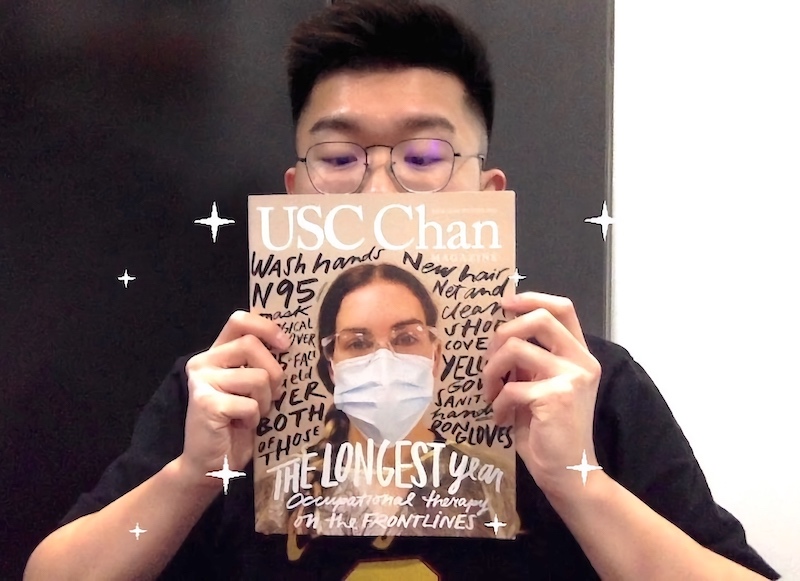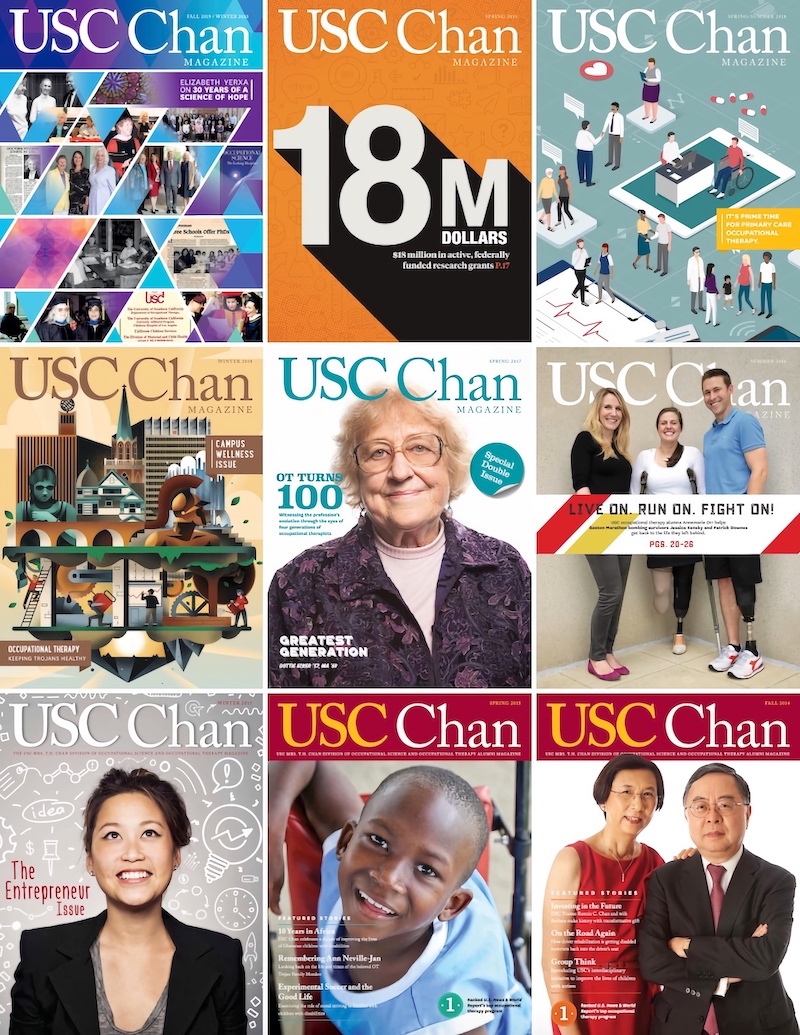Student Blog
Externships
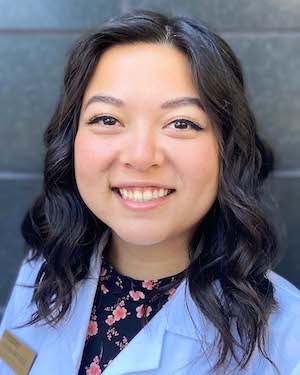
Going Back in Time to High School: My Externship Experience ⟩
April 12, 2022, by Alyssa
Externships
As part of OT 540: Leadership Capstone, all students are tasked to design a leadership experience for themselves across two weeks following spring break. The flexibility of this assignment was intimidating - so many things to choose from. You can do online certifications, shadow healthcare administrators, get involved in policy advocacy, or really . . . anything else you could think of, as long as it relates to leadership development.
I knew that after attending a large part of OT school online I wanted to take advantage of having another in-person learning opportunity. Thus far, I’ve learned that I love the hospital setting, but what if another setting was out there that I just hadn’t gotten the chance to see? So given that I took the pediatrics immersion online, I decided to aim for a leadership experience within a school.
The externship project is specifically NOT fieldwork. You’re not supposed to observe or provide clinical services, so shadowing a traditional school-based OT was off the table. However, it still posed a unique opportunity to explore the role of OT with a population I’m interested in – high schoolers. I attended a high-pressure vocational high school, and I desperately wish I could go back in time and tell myself everything I’ve learned since about taking care of myself. So that was the general theme I was going for.
My goals included:
- Promote the value of occupational therapy in the high school setting through education on the benefits of OT for academic success and student wellness
- Better understand the collaboration between teachers/administrators and OTs in school settings
- Prepare for leadership roles by practicing and developing my professional communication skills.
There are 10 full days to fill with externship activities, and they can be at different sites as long as they’re all related. They could also be completed outside the two dedicated weeks in the semester. I did half of my activities during the externship weeks, and spread out the other half beforehand.
The primary experience of my externship was a collaboration with my high school health teacher back at home in NJ. I worked with her to identify wellness-related needs of her current students and put together general wellness presentations to give to her classes.
The week was wonderfully chaotic. Getting to interact with students and learn more about the behind-the-scenes work of teachers was awesome. Having to evacuate the building mid-presentation because of a gas leak was . . . a lesson in flexibility. Overall, it was incredibly meaningful for me to go home and be back in a familiar setting sharing the benefit of the OT wellness lens with students and teachers.
In preparation for this experience, I connected with Dr. Rashelle Nagata at the USC Kortschak Center for Learning and Creativity for guidance. From Dr. Nagata, I learned more about the role of OT for academic success/wellness promotion for older students, and she was an essential mentor for developing engaging evidence-based presentations. An additional opportunity presented itself to volunteer with an OTD resident at a charter school in LA, so I also spent some externship hours working with her to plan and implement social-emotional learning activities for students there. So in total, that’s 3 sites, 3000 miles apart, mostly in person and partially via Zoom meetings. What an experience!
To any future students, I highly recommend using the externship as an opportunity to try something new and hone your leadership skills along the way.
⋯
Perspectives of a Post-Professional MA to OTD Student: Amy Yeu ⟩
September 29, 2021, by Global Initiatives Team
Classes Externships International
Su-Min (Amy) Yeu, OTD
By Michelle Plevack
Entry-Level Professional Master’s student
In collaboration with Maggie Chen and Prutha Satpute
Global Initiatives OTDs
Editors Alison Chang, Vanessa Elshamy, and Brittany Inouye
Entry-Level Professional Master’s students
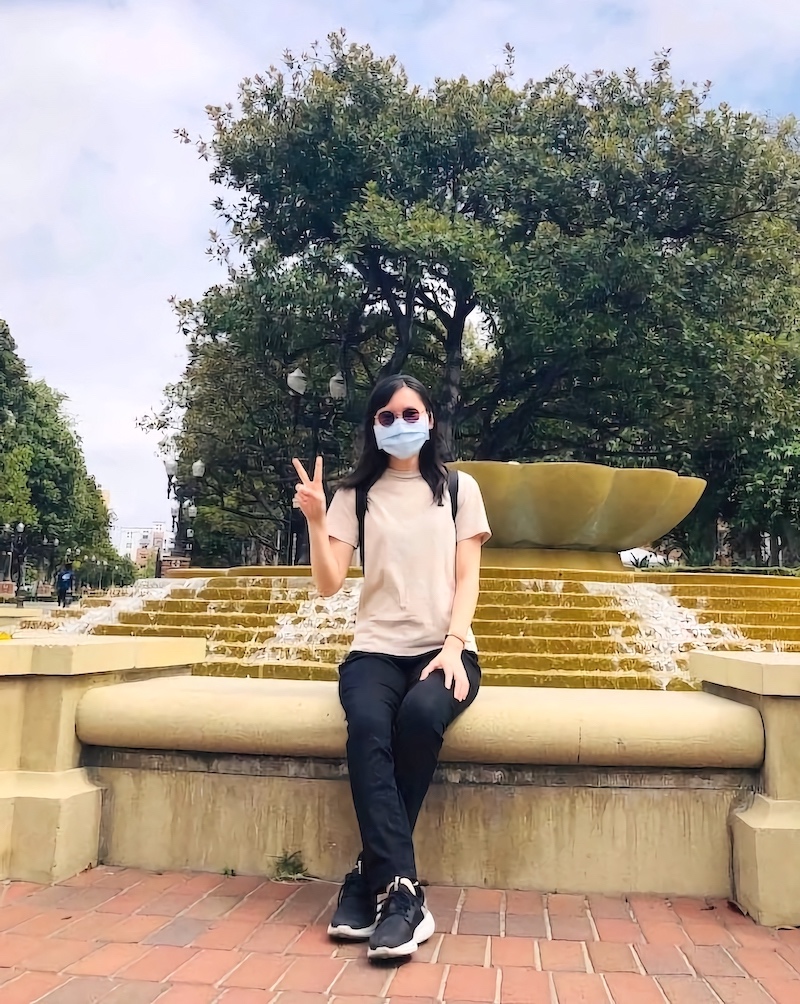
First photo Amy took at USC — OTD, Fall 2021
Global Initiatives OTD Maggie Chen had the opportunity to interview international student, Su-Min (Amy) Yeu. Michelle Plevack wrote this blog with the purpose of sharing Amy’s perspectives of her transition from USC’s Post-Professional Master’s Program to the Post-Professional Doctorate of Occupational Therapy (OTD) Program.
What are some of the factors that influenced your decision to continue your education with the OTD?
Amy: I considered professional, personal, and program aspects. Professionally, I thought about my future career and my goals. As an international student, I thought about what I was interested in but could not learn in my hometown. For example, I know that OT in the United States focuses on health promotion, an area I am interested in. I also thought about the timeline and pathway that I am going to take in the future. For example, when am I going to do the OTD and how long is the program going to be?
Personally, I hope to return to Taiwan. I also thought: if I am not going to do the OTD, then what am I going to do? Am I going to work in the US or am I going back to Taiwan? I also thought about the difference if I did not have the degree: is it only because I want to earn another credential, or is there anything else that is important to me? Another thing I considered was employment, of course. Like many students, I have concerns about paying tuition and looked into residencies that might offer a scholarship or stipend for me. As far as personal goals, it was important for me to travel abroad and to gain new experiences in the US.
Considering programs, I was interested in non-traditional tracks that focus on health and wellness and international relationships. I know at USC they have clinical, research, administration, and pedagogy tracks. I ended up being placed with the Kortschak Center for Learning and Creativity (KCLC — clinical track) at USC which I am very grateful for, and I know at USC, I can choose to have a subspecialty — in research, for example — that could contribute to my career goals.
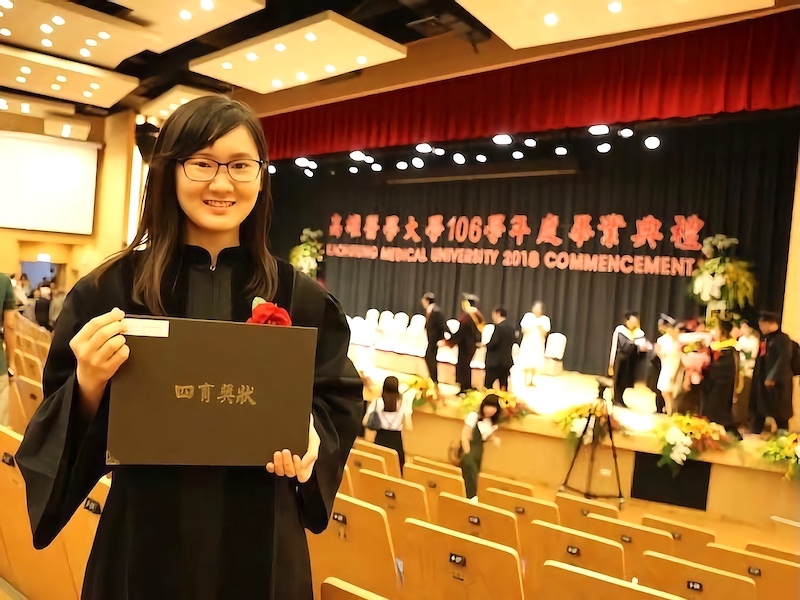
Commencement: Kaohsiung Medical University; Kaohsiung, Taiwan — Senior, 2018
What goals have you set for yourself during your OTD? Why is the OTD beneficial to your future goals and career?
Amy: I want to network and build relationships within the USC community and improve my clinical skills by utilizing my therapeutic use of self, motivational interviewing, and evidence-based knowledge. With these skills, I can not only provide services appropriately, efficiently, and holistically to all students, but also appropriately refer students to other services. As I know these services are not currently popular in Taiwan, I hope to show the efficacy of the services at KCLC by conveying the unique roles and skills of occupational therapy and academic coaching services in universities. My future goal is to improve the quality of life of university students in Taiwan, particularly as a result of the COVID-19 pandemic, by implementing and developing novel ideas into on campus services. I believe having a doctorate level of education at international conferences will allow me to effectively advocate for essential services and pioneer the roles of OTs working in universities.
How has the transition from Post-Professional MA to OTD been?
Amy: This transition looks different depending on what track you are taking. For my clinical track, I spend most of my time in my residency at 20 or 40 hours a week. Compared to being an Post-Professional MA student, your role changes as an OTD student, as you are ‘in the driver’s seat’ where you need to be self-directed, proactive, and create your own structure to support your goals. However, because I am more settled into my role after the MA program, I feel less anxious and confused, and even excited about my coursework. Consequently, compared to being an MA student, there are fewer social opportunities with peers due to the nature of the coursework for the OTD program.
What has been the best and hardest part of the OTD so far?
Amy: The best part is my residency — I feel like I am seeing the endless possibilities of occupational therapy. There have been so many opportunities during the process of integrating my knowledge, experiences, and passions in a way where I am ‘learning by doing’. I get to wake up excitedly, not only because of schoolwork, but also because I am pursuing my dreams while collaborating with people who share the same goals, values, and beliefs. Some difficult aspects of the OTD for me as an international student are the language and cultural barriers, particularly while sharing thoughts. I am still figuring out how to provide services and express my perspectives with the KCLC team in an effective and efficient manner. Due to the cultural differences between myself, clients, and peers, I am also not always familiar with a place or experience they might reference to. Finally, learning to be more flexible due to the uncertainties of the pandemic, such as adjusting to hybrid services, has been a challenging transition as well.
How have you been balancing leisure and personal time with OTD responsibilities?
Amy: I try to be patient and kind to myself. Luckily, I work in a residency that promotes the importance of work-life balance and recommends us to not bring work home. I also try to focus on self-care activities, setting up short breaks, making time for myself, journaling, having snacks, listening to music, catching up with family, and socializing with friends on weekends.
What advice would you give to students about the OTD?
Amy: For those indecisive about the OTD, I would recommend connecting with professors, residents, and other peers who are interested in discussing the OTD. In my experience as a MA student, it can be hard to decide one month into the program if the OTD is right for you. And even though I am very satisfied with my residency, I regret not applying to even more sites! Remember that post-graduation, you do not need to stick to whatever you do for your OTD. If you are planning on doing the OTD, consider what you want to get out of this program. You won’t regret it! Keep dreaming big! Jot down your thoughts, journal, and think deeper. Remember there are no restrictions with what you can do with an OT background. Consider being open to roles or positions not necessarily called OT if they relate to your passions.
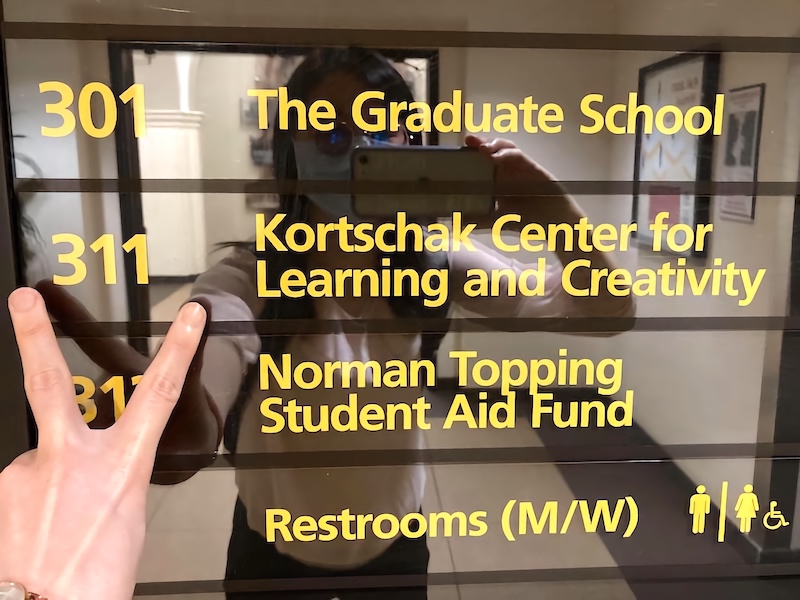
Amy’s residency: USC Kortschak Center for Learning and Creativity; Los Angeles — OTD, 2021
⋯
Externship project — The experience of spiritual participation among people with intellectual disabilities in an evangelical church in Hong Kong ⟩
September 15, 2021, by Global Initiatives Team
Diversity Externships International
By Rebecca Ka Ki Tam
Post-Professional Master’s student
This externship project was inspired by the concept of occupational justice. I worked as a pediatric occupational therapist in preschool settings in Hong Kong before studying at USC. During those days, I had little knowledge about occupational justice. My studies at USC have expanded my understanding of occupational justice and greatly inspired my belief that occupational therapists can advocate for everyone’s right to participate in everyday occupations regardless of age, ability, gender, social class, or other differences (American Occupational Therapy Association, 2020; Nilsson & Townsend, 2010, p. 58). This concept has allowed me to reflect on my experience volunteering in a church in Hong Kong that pioneered spiritual participation among people with intellectual disabilities (ID). I experienced the joy among people with intellectual disabilities in their Sunday services. I wondered, however, whether spirituality is vital to their well-being. This population is one of the most controversial populations to serve in churches since many people believe that individuals with ID cannot fully understand the concept of faith. Thus, I became curious to know more about spirituality in this population — what is their experience in this occupation? How important is faith among people with ID? As revealed in my full article, I started this externship project to explore spiritual participation among people with intellectual disabilities. I conducted interviews in a church that pioneered spiritual participation among people with intellectual disabilities in Hong Kong. I interviewed a participant with severe ID, the participant’s caregiver, a volunteer, and two pastors. I also interviewed Professor Sarah Shea, who is involved in research relating to practical theology and theologies of disabilities and who ministered to marginalized populations at Hong Kong Baptist Theological Seminary.
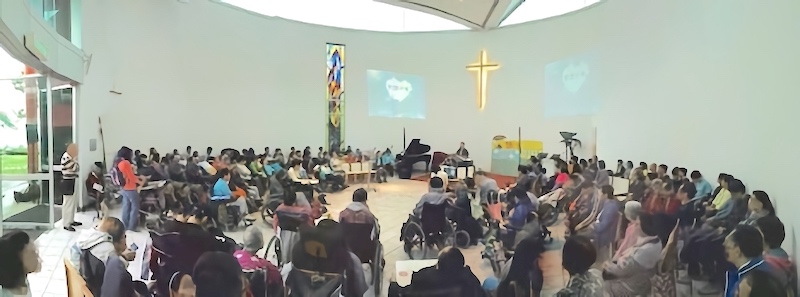
Participants were participating a Sunday Service in an evangelical church that pioneered the facilitation of spiritual participation among people with intellectual disabilities in Hong Kong
One memorable experience during this project was my interview with Anna (pseudonym), who has a severe ID. During the interview, she prayed for me, sang me a gospel song, and joyfully asked me to accompany her to church. Anna revealed how much she loves church life. I was very touched by her warm welcome and explicit love. Her caregiver shared with me that spiritual activities were unique in that they have helped Anna understand more about life and death, and overcome loneliness.
Anna initially was not comfortable talking to me during the interview. At first, she frequently walked away and ignored my questions. I then tried to talk in simple sentences and treated her as a friend. She gradually became more relaxed, sat down, and chatted with me. It reminded me of a pastor’s sharing that it is always important to be “present” — “Take your time, no rush. Be there with them, despite their circumstances, and treat them genuinely as true friends.”
In this project, I further reflected on how the arbitrary binary of “typical” or “atypical” classifications has inevitably become a barrier to genuine communication. Despite differences, we can always treat each other as true friends, learn from each other, and accept support and help from each other. I used to have a misconception that people with different intelligence might have different needs. Thus, it might be suitable to segregate people into various groups according to their needs. However, I realized this misconception was a barrier that had obstructed my genuine interaction and friendship with people diagnosed with intellectual disability. There should not be hierarchies in interaction, but we should celebrate our diversity. In an interview, a pastor shared that occupational justice probably does not merely focus on enabling people to participate in a particular occupation but also emphasizes the meaningful interaction among different people within that context. I envision that the concept of occupational justice will be more widespread someday, and I hope this article will motivate the public to advocate for occupational justice among people with intellectual disabilities.
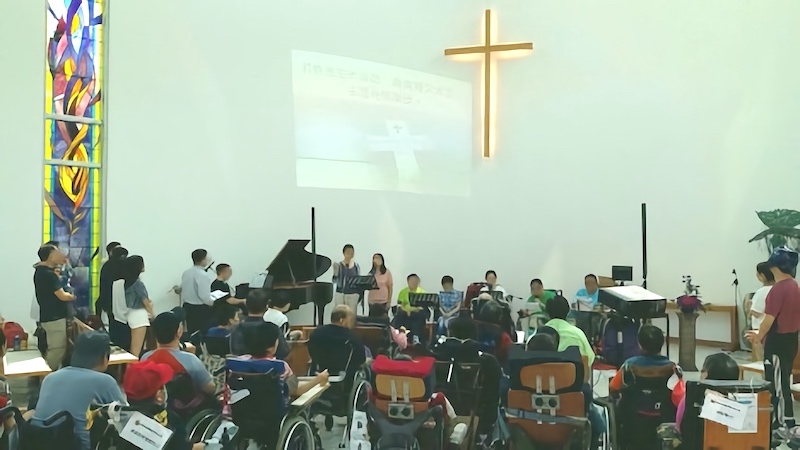
Participants, no matter with disabilities or not, were leading worship
References
American Occupational Therapy Association. (2020). Occupational therapy practice framework: Domain and process (4th ed.). American Journal of Occupational Therapy, 68(Suppl. 1). S1-S48.
Nilsson, I., & Townsend, E. (2010). Occupational justice — Bridging theory and practice. Scandinavian Journal of Occupational Therapy, 17, 57–63. https://doi.org/10.3109/11038120903287182
Tam, R. K. K. (2021, July 15). The experience of spiritual participation among people with intellectual disabilities in an evangelical church in Hong Kong
⋯
Alumni Spotlight: Mineh Badmagharian ⟩
May 3, 2021, by Global Initiatives Team
Classes Externships International
Mineh Badmagharian, OTD, OTR/L
Alumni: Professional Master’s, OTD
By Brittany Inouye and Michelle Plevack
Entry-Level Professional Master’s students
In collaboration with James Lee
Alumni: Professional Master’s, OTD

Mineh describes this photo taken of her at Yerevan Children Railway as, “one of the best moments I had while in Armenia”
Global Initiatives members Brittany Inouye, Michelle Plevack, and James Lee had the pleasure of interviewing Mineh Badmagharian, a double Trojan who graduated from USC Chan’s Professional Master’s and Post-Professional Doctorate (OTD) programs. We are excited to showcase Mineh’s remarkable journey of exploration, perseverance, and love for OT!
Mineh’s Armenian heritage and her experience leaving her birth country of Iran at the age of 12 led her to complete her OTD residency in a community-based mental health setting at Intra Mental Health Center, in Yerevan, Armenia. This move was a difficult transition where she found herself living in a new country, being on her own for the first time, and struggling with language barriers as Russian is the second language spoken in Armenia. Her motivation to address the stigma of mental health in Armenia, her passion for the arts, and her desire to help people led her to slowly settle into her OTD site where she “fell in love” with this setting.
Unfortunately, when the COVID-19 pandemic hit, Mineh’s OTD residency site closed down. In a country with limited internet connectivity, her residency work transitioned primarily to phone communication with clients every day. During her year in Armenia, Mineh realized she was learning in many ways she had not previously anticipated. She found herself constantly checking her assumptions, realizing that there is no single way of thinking or perceiving, and learning how OT interventions cannot be generalized to all backgrounds. She shares that for many people in Armenia, “work” is not as meaningful of an occupation as socializing in the community — a prevalent theme in interdependent cultures. She nurtured new opportunities to connect with her clients by taking Armenian dance classes, which equipped her to engage with her clients in the meaningful social occupations that they valued.
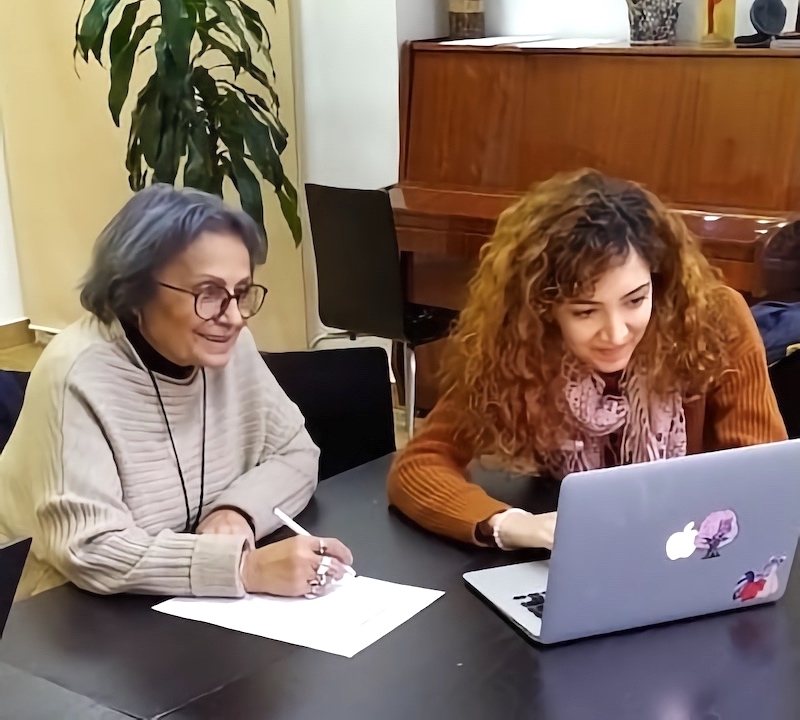
Mineh and her site supervisor Mrs. Anahid Iskandarova working on documentation at Intra Mental Health Center
Mineh describes a sense of community within the site’s office, and she shares that strategies from her Lifestyle Redesign class (OT 583) helped her cope with the pandemic, the trauma of the war in Armenia, and COVID-19 travel restrictions which prohibited her from leaving the country. After finishing her OTD in August 2020, she was hired as the Head of Research and Strategy at Expper Technologies. This robotics company is based in Armenia and Mineh completed her work online while residing in California. Mineh worked with a team to create Robin, an artificial intelligence-based robot companion to children undergoing medical treatments. She helped develop Robin’s personality, the way Robin interacts with kids, and game content that decreases anxiety and fear associated with medical visits. The team spent 1000+ hours acting as Robin, transcribing quotes, and gathering data for Robin’s algorithm.
Although her current job title does not specify her as an occupational therapist, Mineh believes she brings aspects of OT into her role and has future hopes to work in community mental health settings in Armenia. Mineh warmly encourages anyone interested in doing OT international work to “Go do it! Be open to learning!”
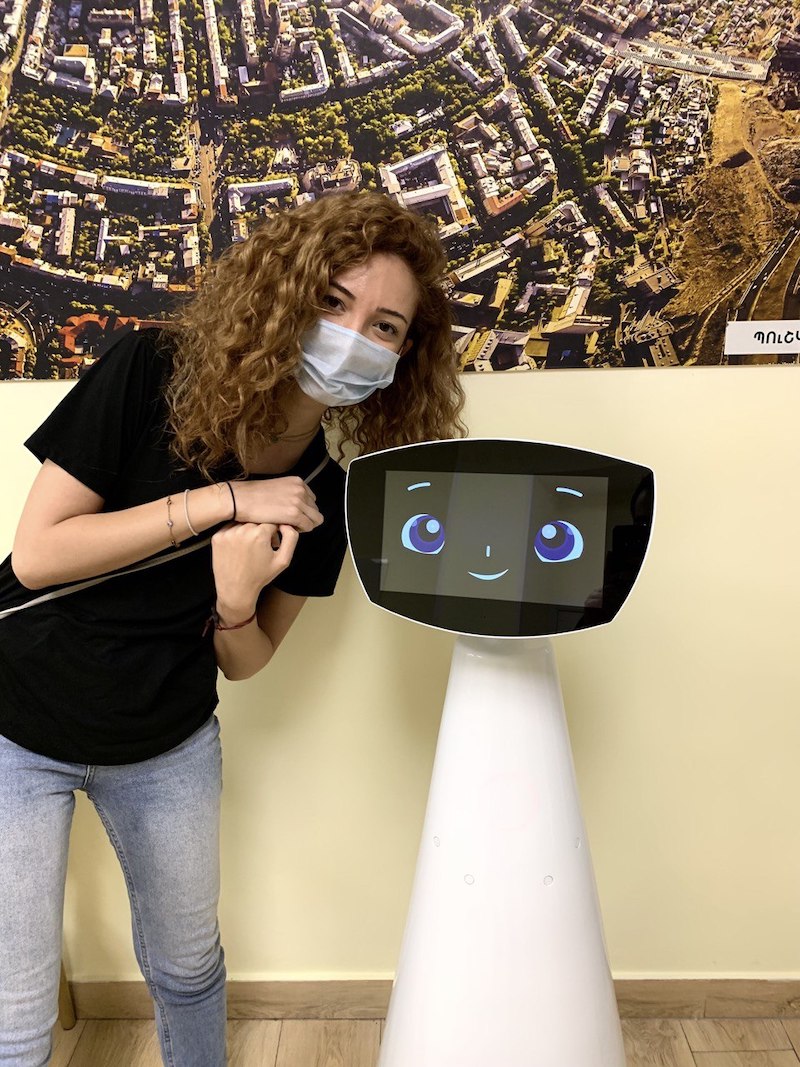
Mineh and Robin!
⋯
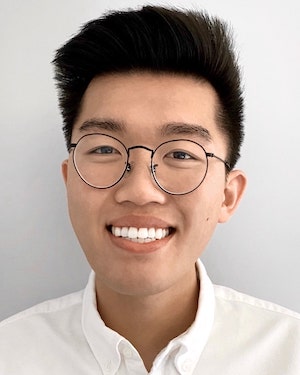
Hot Off The Press!!! ⟩
April 19, 2021, by Calvin
Classes Externships Getting Involved What are OS/OT?
Extra! Extra! Read all about it! Here at USC Chan, we actually have our very own magazine! The USC Chan Magazine is the division’s premier publication and releases twice yearly. The Fall 2020/Winter 2021 issue was recently published, and I had the pleasure of contributing to it as a writer and interviewer. Major thank you to the man behind the magazine, Dr. Mike McNulty, for his guidance, support, creativity and flexibility throughout the entire process, as well as for being such a driving force in making these magazines come to life! So much work gets put into crafting each issue and his collaborative efforts to piece everything together with all contributors is 👏!
Check out the most recent USC Chan Magazine: Fall 2020/Winter 2021 issue!
Here are links to some articles included in the latest issue:
- The Longest Year, by Dr. Carnie Lewis
Reflections on the frontline pandemic experience from a hospital-based occupational therapist. - Lessons Learned, by Calvin Lee (me!)
A new course helps make sense of the pandemic by studying it. - Pain and Pleasure, by Jamie Wetherbe
Face to face and through the screen, a USC occupational therapist helps a client better manage her everyday pain to improve quality of life. - To Do Unto Others, by Dominique Como
Narrowing oral health disparities gaps of Black/African American children with and without disabilities.
I’m also very grateful to have been able to tailor this experience towards my OT 540: Leadership Capstone Externship Project. The externship is an experience where students are provided with the opportunity to build leadership skills and explore an area that is of interest to them. I’ve always been fascinated with the USC Chan Magazine and I was very interested in learning about how an OT lens can contribute to the realm of copywriting and advertisement. I highly recommend giving the magazines a read 😊! Reflecting back, it’s amazing to see how much we’ve accomplished and overcome together as a USC Chan community.
Explore previous issues of the USC Chan Magazine!
⋯






